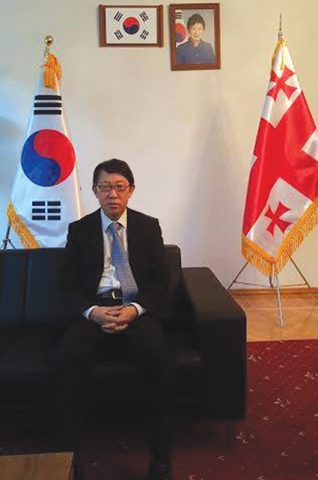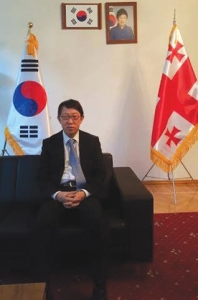In Endurance, Grow Strong: A South Korean Lesson for Georgia
If there is a genuine success story of 20th century state-building, it has to be that of South Korea’s, a war-torn country without any natural resources or geographical advantages, armed only with the iron will and desire to improve - rising to prominence and becoming one of the world’s most advanced states. South Korea’s is an example Georgia could learn much from. The diplomatic residence of South Korea was recently opened in Tbilisi, and GEORGIA TODAY sat down with the Kim Chang-Gyu, the acting Ambassador of South Korea to Georgia, to discuss what the two countries can offer each other.
What is your country’s policy in Georgia? What is the message you bring to the Georgian people?
There are a lot of historical similarities between the people of Georgia and the people of South Korea. Both nations are thousands of years old, the geography is very similar, and we both had to fight constantly for our survival throughout our history. Like Georgia, South Korea doesn’t boast a lot of natural resources that you could build on in modern times, but we both have heart and brains to fight for a better future. That, I think, sums up the message I bring. As for our policy here, we are looking to deepen our cooperation with the public and civil sector, share experience, and learn from each other. We are working in several fields, among them export of Georgian goods to Asian markets, improving aspects of public transportation here, and sharing know-how in technology. An interesting aspect of our collaboration could also be the tourism sector – for example, South Korea, like Georgia, is a mountainous country. We have a modern, well-developed winter resort system – in fact, we are preparing to host the 2018 Winter Olympics. We are ready and eager to share our experience in this field with our Georgian colleagues, as winter sports and tourism happens also to be one of Georgia’s chief tourism priorities. All in all, I believe our cooperation will only result in success for both countries.
The rise of South Korea from a developing country to one of the world’s most advanced is indeed a great success story. How did it happen?
Back in the 1950s we were presented with an existential dilemma: we realized that we had to either significantly change our mentality, the way we viewed the world, or we would cease to exist as an independent nation. And this realization, and the subsequent choice we made to adapt and survive, brought about that rise. Great economic reforms were introduced that led to an export-oriented economy. What made us achieve that? I think the safest bet would be to say that we relied on the brains of a young, open-minded generation. In the sixties, the government asked every South Korean student that was studying abroad, mainly in the US, to come back to teach what they’d learned. We created a very attractive environment for them – the salary of a university professor was at times higher than that of a minister and the President! South Korea became an education-driven country, which in turn led to the success in the field of technology that our country is so proud of today.
Speaking of technology, you’ve recently paid a visit to Tbilisi Tech Park. What were your impressions?
I was impressed with how driven and energetic people were there and it is indeed a step in the right direction. We created our analogy to the Tech Park almost half a century ago, in the 60s. It was an investment in the future and it paid off greatly – I think you could say that all those world famous South Korean companies that you hear so much about, such as Samsung and Kia, owe their existence to this technocratic wave that happened back then. I am more than certain that, with correct management, it will pay off greatly for Georgia, too.
Despite becoming an advanced, well-developed country, South Korea still suffers from territorial disputes with its neighbors. What is there for Georgia to learn from the example of South Korea?
As I said earlier, throughout their history, both Georgia and South Korea had to fight for survival. Our lands are situated in a geographical position where there are some big actors playing their games. The ability to maintain your policies in such a situation is a big challenge, but I would like to think my country is doing that and would advise Georgia to do so, too. Neighbors, friends, third parties can offer valuable advice, share their experience and so on, but they cannot dictate what to do – you, Georgian society, must make up your own mind about what direction you want your country to go and evolve in.
South Korea has the world’s sixth largest number of active troops – would you also say that there lies another lesson for Georgia?
I would say it is only natural to assume that you should be ready to defend yourself. In South Korea, it’s mandatory to serve several years in the army in your youth. Of course there are young people who don’t share the enthusiasm, but it is a generation which didn’t have to go through the hardships of war and rebuilding as their parents and grandparents did, so maybe there is a lack of ability to see the big picture playing a role here.
North Korean missile tests and the recent rocket launch is enough of a stern reality to keep people in check. What is your government’s position on this? Is the international condemnation severe enough punishment?
First of all, I would like to thank the Georgian Ministry of Foreign Affairs for their statement condemning North Korea’s actions. It’s a very important step for us, it means people realize how big a threat it is; that it is not a danger that is confined to just one country and one region- it should be a cause of alarm for the whole world. I’d like to underline that the satellite rocket launch was preceded with hydrogen bomb test earlier that month. This is a challenge for the whole international community and we are cooperating closely with international forces to devise a mechanism of punishment and prevention of such actions in the future. After the emergency meeting at the UN Security Council, a consensus was achieved over further sanctions on North Korea. The world’s major powers, including the United States and China, are right now negotiating over the scale of the sanctions. As for us, I think our President’s response sums up our stance perfectly: She said that Seoul is determined to make North Korea realize its nuclear ambitions will result only in accelerating its “regime collapse”. That is our agenda and we will rely on the international community to achieve it.
Vazha Tavberidze












